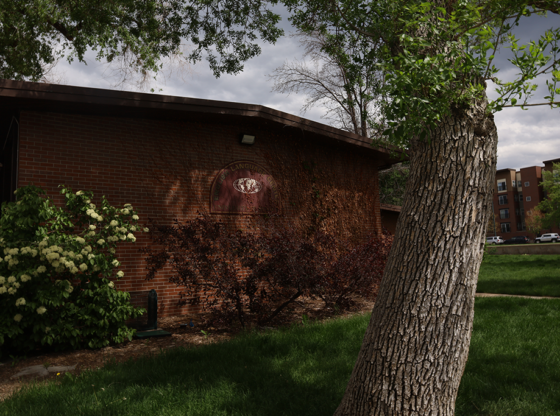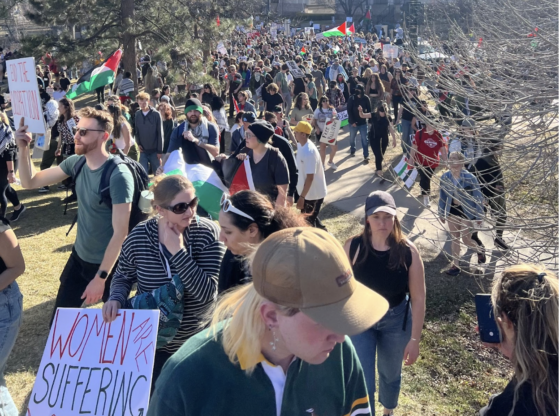It’s been over a year since issues of free speech were brought to the forefront at DU. The controversy began when a message supporting the Black Lives Matter (BLM) movement was altered on the university’s designated “free speech wall” to lyrics from a song titled “Guilty of Being White.” The defacing of the BLM message caused uproar among several student organizations and faculty members. Since the incident, the university has employed various tactics to balance its support for open dialogue during a time when free speech has unfortunately become synonymous with hateful or racist speech.
The university initially responded to these events by issuing a statement condemning racist rhetoric on campus, while also shifting existing surveillance cameras so as to capture the free speech wall and the individuals who engage with it. Following this decision, the DU Faculty Senate published a document called “The University of Denver Statement of Policy and Principles on Freedom of Expression,” which outlined DU’s vision, values and mission when it comes to the First Amendment’s presence on campus.
Although DU’s efforts appear to be genuine, the administration has received backlash from students, faculty and staff with each step they have taken.
DU received criticism for its decision to monitor the free speech wall from student activist groups as well as from free speech proponents outside of the DU community. “By closing students’ avenues to speech under the guise of protecting it, DU does itself and its students a disservice,” claims an article published by the conservative Foundation for Individual Rights in Education. “DU casts its surveillance and condemnation of anonymous speech as if it is in service of open dialogue is an embarrassment,” writes the article’s author.
Emma Decker, who at the time was the president of the Feminist Student Alliance (FSA) and a member of Black Student Alliance (BSA), offered a different view. “As a student, I didn’t feel their message was as to the point as I wanted. For me at that time, I felt like there wasn’t enough of a stand. There wasn’t enough of a message of support for the students who were feeling hurt by the wall,” she said. Decker is currently the program coordinator in the Office of Student Engagement at the university.
And while it may have seemed as if these criticisms influenced the DU Faculty Senate to release the free speech document, discussions about free speech had predated the wall controversy, according to DU faculty member Derigan Silver, who was a member of the committee that drafted the free speech document. Efforts began earlier, in the summer of 2016, he noted. The faculty wanted “to be proactive, to think about if something arose at the University of Denver, how would we want to handle it. The committee and the document appeared as if it was a reaction to events surrounding the wall but it was not,” he emphasized.
It is clear that this yearlong debate has put DU’s administration between a rock and a hard place while trying to navigate this free speech balancing act. With the creation of the free speech document, the DU Senate also voted to create the University Committee for the Promotion of Free Expression. The creation of the document and the committee appeared to be a response mechanism employed by DU to serve as damage control.
This type of free speech document and committee is not unique to DU. Both private and public universities have created organizations to promote freedom of expression as issues over speech have manifested in different ways around the country. A prominent example is Harvard’s document underscoring that university’s free speech guidelines.
Silver explained that even though the DU document was carefully created and went through several rounds of editing, it still received plenty of criticism.
“I don’t think we were ever under the delusion that it would be accepted by everyone, but the criticism that I have seen is this idea that supporting free speech is supporting racism or is empowering very hateful speech,” explained Silver. He went on to acknowledge that he “certainly understands those coming from that viewpoint, but we worked very hard to make it clear that we want a proactive response to that kind of speech on campus. We want counter speech, we want the university to say, ‘these are not our views and not our values.’” Silver emphasized that DU as an institution has the same fundamental rights as students to denounce speech that doesn’t reflect the University’s values, while still leaving channels open for opposing opinions.
Some student organizations, like the Social Justice Solidarity Community, have criticized the Faculty Senate document, articulating their belief that the document disproportionately allows for racist speech that mirrors what white supremacist protesters are calling for today.
With the creation of the free speech document, the DU Senate also voted to create the University Committee for the Promotion of Free Expression.
The DU Committee for the Promotion of Free Expression is still in the process of forming, so it is hard to tell what kind of role it will play in mediating free speech and hate speech within the private institution, according to Silver. “The committee was created to promote the interchange of ideas in a thoughtful manner. Looking at the ‘free speech wall,’ having people write on a wall in the middle of the night is not a great way to increase dialogue,” he explained. According to the official document, the committee will be tasked with providing forums and opportunities to discuss opposing viewpoints in a constructive manner, as well as serving as a working group to help the administration handle issues of speech.
When asked about the forming free speech committee, Decker stressed the importance of reaching out and supporting all members of the DU community, especially those who feel unsafe on campus. “I challenge the group to think outside of points of privilege and talk to people who are affected by these events on campus,” she said. “I think communicating with different students is important because it has more to do with how safe and supported they feel, than with the actual messages.” Decker went on to advise, “When these things do happen it is important to look at how DU as a community can challenge those notions so students who do feel unsupported have an outlet.”











